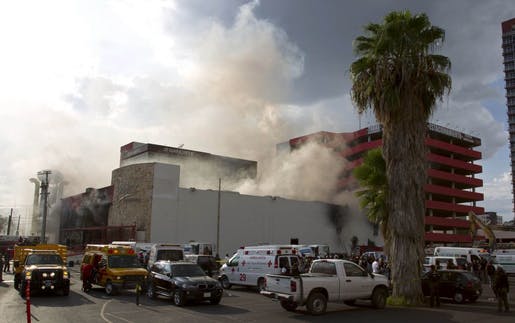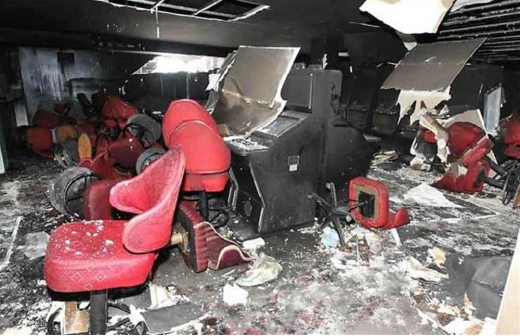MONTERREY, NUEVO LEON — Ten years after Zetas cartel gunmen stormed into a casino in northern Mexico and set fire to the building, killing 52 people, nobody has been convicted for murder or arson.
The fire at the Casino Royale in Monterrey was one of the worst attacks on civilians during the country’s 2006-2012 drug war. The notoriously violent Zetas, now weakened and fragmented, set the fire to enforce a demand for protection payments.
A decade later, only five of the alleged attackers have been convicted on unrelated weapons charges. Relatives of those killed in the Aug. 25, 2011, fire said this week that justice in the case still remains remote.
Only a simple memorial of dozens of white crosses remains to mark the vacant lot where the casino stood. The crosses bear the names of the victims, largely women who either worked at the casino, were there to play bingo or had gone simply to lunch at the restaurant.
Twice, the crosses have been removed. Always, the families have doggedly fought to replace them.
Survivor Samara Pérez lost her son, Brad Xavier Muraira, 18, in the attack.

Pérez recalled the moment when armed men burst in and began to douse the casino with gasoline. Within seconds, a peaceful day at the casino turned into pandemonium.
“I heard a commotion, I turned around and I saw a man hit a woman with gun,” Pérez recalled.
“It didn’t last long, we didn’t know it was gasoline until the smoke started,” she said. “I started to look for my son. I couldn’t find him, the chaos broke out immediately.”
Pérez, who has served as a spokeswoman for the victims’ families, said a decade-long nightmare began that day. “It wasn’t until many hours later that I found out my son had died.”
Within weeks, authorities had detained 17 suspects in the attack. But a federal official, who was not authorized to be quoted by name, confirmed that only five of the suspects had been convicted and just on weapons charges not directly related to the casino fire. Those charges were for the guns they were carrying at the time they were arrested.
The official said the investigation remains open.
Many of the suspects have sought court injunctions that Pérez fears may result in them never being brought to justice. Mexico’s notoriously generous injunction system allows suspects to freeze the actions of authorities on they grounds they might violate their rights.
“We have never seen real justice, to this day,” Pérez said, adding that victims’ relatives have been denied access to case files, which is their right in Mexico.
As the years pass, the families fear the case will get less and less attention.
“Gov. Jaime Rodríguez Calderón would not even meet with us, and I would ask President Andrés Manuel López Obrador to undertake a thorough review of the judiciary, so that justice is done in these cases,” said Pérez. “Nobody is above the law.”

To add insult to injury, in April workers who were demolishing the remains of the casino tore down a perimeter wall where the families had placed crosses. The city government has promised to replace the wall.
“It was a lack of respect for the families, trying to take down the memorial,” said Luis Javier Nava Walss, who lost his mother, Idalia Walss, 46, in the fire. “Now we hope it will be there permanently.”
For some, the government has failed to fulfill even its promise to bury the victims. Marisela Ramírez Cano lost her daughter, casino employee Claudia Castillo Ramírez, 25, in the attack.
Four years ago, the cemetery where her daughter is buried called her to say the government had not paid for a permanent gravesite, and that she would have to move the remains.
“After six years, I had to take her out of the cemetery,” said Ramírez Cano, who received an ossuary box containing her daughter’s bones. “That was a show of disrespect.”
Source: OEM






